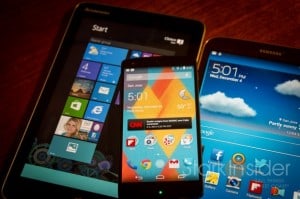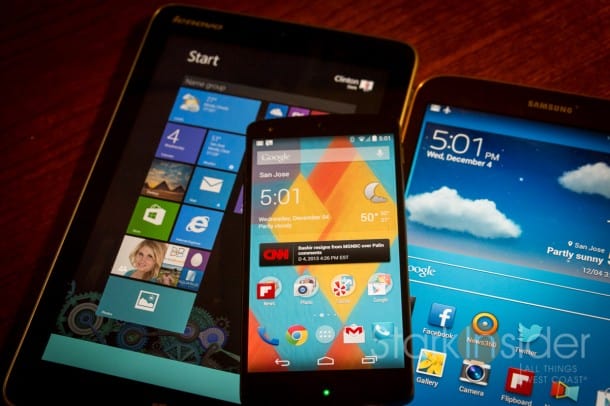
Word is Google will kill the Nexus brand some time this year, or in 2015. As most already know Nexus is the moniker given to devices–tablets and smartphones–sold direct by Google on its Play Store. That line-up currently includes the Nexus 5 (LG), smartphone, and Nexus 7 (Asus) and Nexus 10 (Samsung) tablets.
A few key defining qualities encompass Nexus products.
Most importantly is price — it’s usually very competitive (the superb, flagship LG-made Nexus 5 starts at only $349 vs. $599 for the competition). Likely, Google has subsidized the price of the hardware in an effort to bolster market share. Many would argue this is hardly as necessary today as it was, say, in 2009 when we we’re just getting to know the charms of “Droid Does”, and the Android storm that was about to forever change the mobile landscape.
Another key point related to the Nexus program is that of stock Android. Devices are sold “pure”. That is, they don’t contain any of the skins you find from devices sold via the carriers. So that means no MotoBlur (Motorola), TouchWhiz (Samsung) or Sense (HTC). Years ago these were the scourge of the mobile world. They added bloat, were poorly conceived and had user interfaces that weren’t far removed from what a kindergartner could draw up on a chalk board (er, iPad). A lot of that has changed. Look at what Samsung has done with its Android skin on the Galaxy S4 – it’s awash in amazing features and innovation. Still, Nexus was all about Android was capable of without meddling. It was a shot straight to the heart. For many of us, it’s the only way to go – no bloatware, lots of speed, and the Android experience as Google intended.
Because Nexus devices are sold direct by Google, and come with stock Android, they also receive faster updates. While Verizon, T-Mobile and AT&T have to do a fireside QA dance with Samsung, HTC, Motorola and others, Google can cut to the chase and give users the latest and greatest Android updates. That means your one year old phone may all of a sudden find new life after getting an OTA (over-the-air) update to Android 4.4 (KitKat).
Best of all, though, a Nexus logo means unlocked. No carrier commitment. No two year contract. This is probably my favorite feature. I can pop in a sim card and go.
While the Nexus program made sense in 2010, the mobile landscape has changed a lot in recent years. T-Mobile is pushing the “un-carrier” agenda hard. HTC, Samsung, and Motorola are making phenomenal Android handsets that can go toe-to-toe with the Apple iPhone. Meanwhile the Android operating system is dominating the market – it’s far from the underdog that once needed a kick in the pants from Google to bootstrap its early success.
Whether or not the rumor is true (and I believe it is), Google should kill the Nexus program.
For one, it’s as nerdy a name as anyone in tech can recall. Blade Runner (1984)? Classic film. Amazing. But does the Nexus name, which no doubt was lifted from Ridley Scott’s neo-noir masterpiece, resonate with women? Mainstream buyers? iPhone users?
Google Play is the new mantra.
Last year Google renamed all of its online services using “Play” branding: Google Play Books, Play Movies, Play Games, Play Newsstand, etc. I aborhed the naming convention (“Play Books”?!), but have come to accept it, even like it. It only follows that if it really wants to put the proverbial wood behind the arrow that the branding extend to physical products too. And it has. In 2013, to many’s surprise, Google added “Play Edition” versions of popular handsets such as the HTC One and Samsung Galaxy S4 to its online store. Like Nexus devices they were unlocked, required no carrier commitment. But, they were not subsidized. Prices were higher. It perhaps demonstrated that Google realized that it was better off focusing on platform, services, and futurethink (Google Glass, self-driving cars), and not the mundane business of hardware — Motorola Mobility acquisition notwithstanding.
With an increasingly saturated mobile market, Google’s next target may well just be iPhone users. Switchers. Those on the verge. If that’s the case, Nexus is not the bait. Apple value ease-of-use, bespoke packaging, and failsafe operation. Above all, Apple is a lifestyle. In order to tempt that potential buyer–the would-be switcher–Google needs something friendlier, cooler, more approachable. That could be “Google Play Edition” (but what a mouthful!) or it could be something else. But it’s most likely not Nexus. I won’t cry in my beer when Google retires the brand. I’ve been on board for three iterations of the Nexus phone (Samsung Galaxy Nexus, LG Nexus 4, and 5), but know all good things must come to an end. Long live the new flesh!


